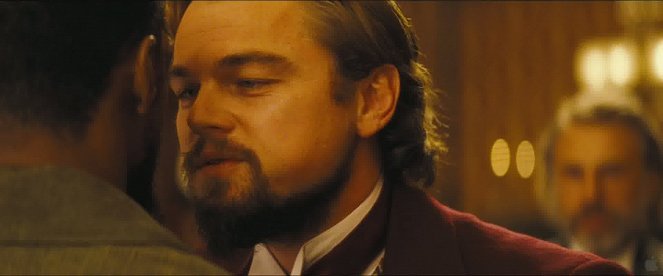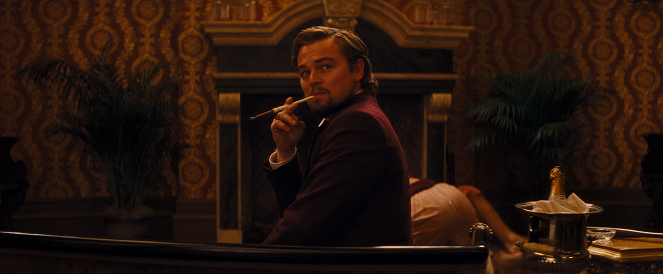Directed by:
Quentin TarantinoScreenplay:
Quentin TarantinoCinematography:
Robert RichardsonCast:
Jamie Foxx, Christoph Waltz, Leonardo DiCaprio, Kerry Washington, Samuel L. Jackson, Walton Goggins, Dennis Christopher, James Remar, David Steen (more)VOD (3)
Plots(1)
Django is a freed slave, who, under the tutelage of a German bounty hunter, becomes a bounty hunter himself. After taking down some bad guys for profit, they track down Django's slave wife and liberate her from an evil plantation owner. (Sony Pictures Home Entertainment)
Videos (42)
Reviews (17)
Not much of an homage to spaghetti westerns, despite Franco Nero's cameo, rather, some kind of (commendable) anti-racist prod that doesn't even make much sense at the end. The experience resembles a sine wave, as long as Waltz is on screen with his enthusiasm, it's a treat that honours even Western rules. But from the moment we meet DiCaprio, the film goes downhill in quality, where the genre's name would best fit the phrase "typical Tarantino crap" and where the "warrant in your pocket" moment (what a coincidence!) is such a cheap, illogical screenwriting crutch that only a naive viewer can buy it. I could expect anything from Tarantino, but not a cliché like this. And the violence, with hectolitres of squirting ketchup, is so over-stylized (especially in the final carnage) that I'm actually tired of it. PS: The scene with the Ku-Klux-Klan will make anyone laugh, myself included.
()
I was afraid, I don’t like westerns, but I like Tarantino. Fortunately for me, Django Unchained is not even close to a thoroughbred western. It’s just a fun Tarantino movie in the Wild We… South mixed with blaxploitation. After 1200 comments in Filmbooster, it’s hard to come up with something original or interesting to say about Django, so what follows is a couple of personal incoherent rants and observations… The scene with the predecessor of the Ku-Klux-Klan is very funny. The carriage wandering around the American wilderness with a giant model of a tooth on the roof is incredibly cool. Hans Landa can be a nice guy. I wouldn’t like to run into DiCaprio with a hammer. Samuel. L. Jackson is a badass. I liked Inglorious Basterds better :)
()
Black dynamite. A provocative kick in the balls, which Tarantino inflicts with xenophobia and racism in the field of the "white man" genre, such as the western (but at the same time, in a way, he does not spare the "niggaz"). If I am to blame Django Unchained for anything, it would be that, in addition to the fact that some parts really look like they were edited by a high negro using autogen, then perhaps just its very digital look. I know that Tarantino simply wanted to give the western locations a modern patina, and I know he didn't want to unnecessarily tie himself down with spaghetti western conventions, but in some places Django Unchained looks stylistically quite weak (rather, it lacks style - I think it is important to see Django Unchained in the movie theatre mainly so that one can enjoy the choruses of laughter). But I would end the criticism there. Perfect punch lines (they don't hit you - they tear your balls out and stuff them down your throat), great acting attached to great characters, absurd black humor, irresistible volatility between sublime epics, blaxploitation and grind-house blood, dramatic timing that Tarantino won me over with despite my years of resistance in Inglourious Basterds. What I enjoy most about his new films is how he turns his light, bloody and disrespectful hand against great history and "sociocultural" concepts. This black version of the Nibelungs, where the white pride of the KKK can't see through the bags on the road and a German drinking beer is fighting against the colonels in white... well, it just grabbed me by the balls.
()
SPOILERS AHEAD. My second viewing of Django Unchained clarified some seeming structural faults (the triple ending, the ineffectiveness of the romantic storyline), but it still seemed to me that the film has fundamental problems with pacing and cohesion: the continuously changing tone is quite gratuitous, some shots and scenes stick out of the film (the double cameo by Zoe Bell as a woman watching the approaching Django and Schultz from a window and as a gang member). It doesn’t matter that the characters do a lot of talking about things for which a single shot would have sufficed – Tarantino has always been stronger at interior dialogue than narrative images, so we can understand the landscape here as serving a purely decorative purpose. What’s problematic, however, is that some of the dialogue-heavy scenes don’t push the narrative along, nor do they offer any other value added such as slowly built-up tension (which was a major component of Inglourious Basterds). The strangely edited KKK digression after the Brittle brothers are captured (the inserted flashback seems somewhat confusing at first) is nothing more than filler. One storyline concludes, but the next (Hildi) hasn’t yet been opened. The narrative stands still for several minutes. Schultz’s subsequent familiarisation of Django with the rules of the market mechanism initiates the transformation of the slave into a master, which culminates with a radical change of wardrobe. Together with the education in capitalism, however, there is the rather unnecessary (in terms of the narrative, not the viewing experience) training of Django to be the fastest gunslinger in the American south. Despite that, the multi-layered transformation of the protagonist ranks among the best instances of character development in Tarantino’s entire filmography. From the beginning, we are prepared for Django to take over responsibility from his master, toward whom he first behaves like a little boy, eager to learn what has become of his German princess. However, he gradually exhibits more and more independence, though the roles he has to play, which definitely do not suit him, prevent him from fully expressing himself (his microworld has to be subordinated to Schultz’s, with which he later comes into conflict, powerfully for the first time in the scene with the dogs). With all the more bombast in the blaxploitation-style climax, he can take on the position of head moral authority, throw off all masks (and the saddle from his horse) and, as a completely free hard-ass black motherfucker, shoot about two dozen white devils (and one assimilated black man who reveres his master more than his own mother and undergoes a similar shift in meaning in relation to his master as Django does). Finally, Django explicitly sets out to do what Tarantino does behind the camera – break down stereotypes. Most of the characters that the German former dentist and the freed slave encounter correspond to a certain archetype from American mythology or from exploitation cinema (mammy, the Southern belle, the villain obsessed with eugenics). Unfortunately, Hildi is no exception; for Tarantino, she is an unusually one-dimensional female character who is mostly allowed only to cry, scream and be rescued. Django Unchained is an incredibly stylish affair, excellent in many of its constituent parts (soundtrack, actors, punchlines) and bold in its refusal to respect the conventions of westerns (though Italian directors had much earlier violated some of them, e.g. shooting a horse and using white American cowboys as villains), but as a whole, the film is not entirely cohesive. In terms of making an impression, however, it is almost perfect with respect to the intensity of viewing pleasure and I will watch some of its scenes many more times.
()
(less)
(more)
Tarantino professes his love for tough guys with a gun at their waist and no matter how he reshapes the whole Western world to fit his own image, he never steps out of the story, the homage or the timely light-hearted mood for a moment. And whether rap plays in the soundtrack, the main hero puts on sunglasses or the irresistible Leo plays wildly over the top, I still know that this is essentially a perfect genre film. It's just that its director, despite his outstanding work, becomes a victim of himself. After the emotionally richer Kill Bill and perfectly polished Pancharts, there is simply nowhere to go in the quests for revenge and in the infinitely unsettling dialogues with a grounding progression.
()



Ads